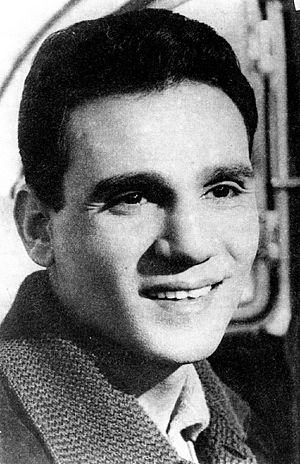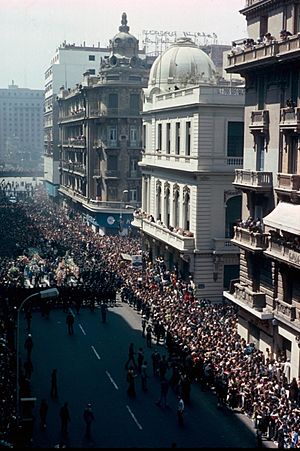Abdel Halim Hafez facts for kids
Quick facts for kids
Abdel Halim Hafez
عبد الحليم حافظ |
|
|---|---|
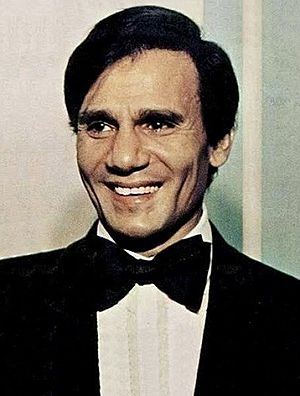
Abdel Halim Hafez in 1970s
|
|
| Background information | |
| Birth name | Abdel Halim Ali Shabana عبد الحليم علي شبانة |
| Born | June 21, 1929 El-Halawat, El Sharqia, Egypt |
| Died | March 30, 1977 (aged 47) London, England |
| Genres | Egyptian music, Opera |
| Occupations | Singer, actor, music teacher, conductor, film producer |
| Years active | 1952–1977 |
| Labels | Mazzika |
| Associated acts | Umm Kulthum Mohamed Abdel Wahab Shadia |
Abdel Halim Ali Shabana (Arabic: عبد الحليم علي شبانة), known as Abdel Halim Hafez (Arabic: عبد الحليم حافظ), was a famous Egyptian singer, actor, and conductor. He was born on June 21, 1929, and passed away on March 30, 1977. Many people consider him one of the greatest Egyptian musicians. Other famous musicians like Umm Kulthum and Mohamed Abdel Wahab are also in this group. As he became more popular, people called him 'el-Andaleeb el-Asmar', which means The Dark-Skinned Nightingale. He has sold over 80 million records, which is a huge number!
Early Life and Music Beginnings
Abdel Halim Ali Shabanah was born in El-Halawat, a village about 80 kilometers (50 miles) north of Cairo. He was the youngest of four children. Sadly, his mother passed away shortly after he was born, and his father died a few months later. This left him and his siblings as orphans. He spent some years in an orphanage and was later raised by his aunt and uncle in Cairo. During his childhood, Abdel Halim faced many challenges because his family was very poor.
Abdel Halim's talent for music showed up early, when he was in primary school. His older brother, Ismail Shabanah, was his first music teacher. At 14, he joined the Arabic Music Institute in Cairo. He became known for singing songs by Mohammed Abdel Wahab. He later left the Higher Theatrical Music Institute, where he had been studying to play the oboe.
Starting a Musical Career
Before becoming famous, Abdel Halim worked as a music teacher in schools. He taught in cities like Tanta and El-Mahalla El-Kubra. While singing in clubs in Cairo, he got a big break in 1953. He had to fill in at the last minute for another singer during a live radio show. His performance was heard by Hafez Abdel Wahab, who was in charge of music for Egyptian national radio. To show his thanks, Abdel Halim took 'Hafez' as his stage name.
At first, some people didn't like Abdel Halim's new style of singing. But he kept going and soon became very popular. He was loved by people of all ages and became known as Egypt's first romantic singer.
He worked with famous composers like Mohammed Abdel Wahab. Together, they created many beloved love songs. Some of these include Ahwak ("I adore you") and Nebtedi Minen el Hekaya ("Where should we start the story"). He also teamed up with Egyptian poet Mohamed Hamza. They made hits like Zay el Hawa ("It feels like love") and Sawah ("Wanderer").
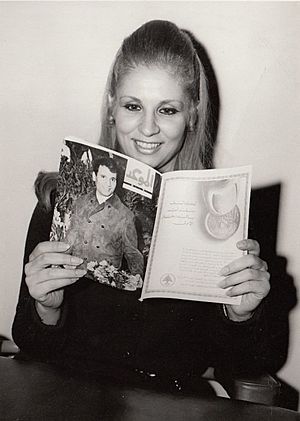
Abdel Halim was incredibly popular throughout his career. His concerts were always sold out. Even though he was famous, he rarely released studio albums. This is because he mostly performed live. He could play many instruments, including the oboe, drums, piano, oud, clarinet, and guitar. He was involved in creating every part of his songs. He also brought new instruments to the Arab World. People loved his deep passion and unique voice.
He performed in almost every country in the Arab World and also in Europe. He sang many inspiring patriotic songs for Egypt. He also dedicated some songs to other Arab countries during their revolutions and wars. He helped many young artists and actors start their successful careers. His entire collection of music was bought by the Mazzika group in the early 2000s.
His Fame and Impact
In Egypt, Abdel Halim is known by many special names. People call him the "King of Music," "The Son of Nile," and "The voice of the people." He is also known as "The son of the revolution" and "King of emotions and feelings."
His patriotic songs were sung by many people during the Egyptian Revolution of 2011. One person said that his songs "inspired us during the January 25 revolution." They added that even though he passed away years ago, his songs continue to inspire Egyptians. His albums and CDs have sold more copies since his death than any other Arabic artist. His singing style and popular songs made him a role model for many modern singers. People of all ages in Egypt and the Arab world still love his music. He is still remembered in the hearts of many.
Personal Life and Health
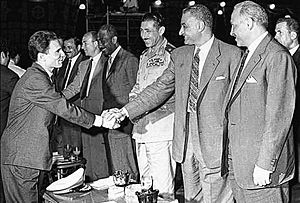
When he was 11, Abdel Halim got a disease called schistosomiasis. This was a rare illness caused by parasites in water. He suffered from it for most of his life. Even with his illness, he stayed positive and kept making and performing his songs.
Abdel Halim never officially married. However, there were rumors that he was secretly married to actress Soad Hosni for six years. People close to both singers have said this rumor is not true.
In 1969, Halim built a hospital in Egypt. He made sure that everyone, rich or poor, received equal treatment there. He also became good friends with many leaders in the Eastern world. These included President Gamal Abdel Nasser of Egypt and King Hassan II of Morocco. He was also very close with most Egyptian poets. He sang directly to President Nasser many times.
His Illness and Passing
Abdel Halim Hafez suffered from a liver disease called cirrhosis. This was caused by schistosomiasis and led to his death in 1977. He first found out about his illness in 1956 when he had stomach bleeding.
Many doctors from Egypt, England, and France treated him during his illness. He had a private secretary, Miss Suhair Muhammad Ali, who worked with him from 1972. She was with him in all the hospitals where he stayed. He received treatment in hospitals in Rabat (Morocco), London (England), and Paris (France).
Abdel Halim passed away from liver failure on March 30, 1977. He was undergoing treatment for his illness in King's College Hospital, London. His funeral in Cairo was attended by millions of people. It was one of the largest funerals in the history of the Middle East, apart from President Nasser's. He was buried in Al Bassatin Cemetery in Cairo. People say he had many more dreams he wanted to achieve, but his early death stopped him.
His Lasting Legacy
Abdel Halim Hafez recorded over 300 songs. He also starred in 16 popular films. One of his films, Dalilah (دليله), was the first color movie made in the Middle East.
He was also one of the main people who started the Egyptian recording company Soutelphan. This company is still active today as part of Mazzika.
A movie about his life, "Haleem", came out in 2006. It starred Ahmad Zaki as Abdel Halim. In the same year, a TV show called "Al-andaleeb hikayt shaab" was made in Egypt. Shadi Shamel played Abdel Halim after winning a TV competition.
On June 21, 2011, Google celebrated his 82nd birthday with a special Google Doodle on their homepage.
In 2019, Lebanese singer Carole Samaha performed with a hologram of Abdel Halim Hafez in Cairo. This was Egypt's first hologram concert, called "Helm" (dream).
Popular Songs
Here are some of Abdel Halim's most famous songs:
- "Ahwak" (I adore you)
- "Ala Ad El Sho'" (As much as the longing)
- "Ala Hesb Wedad" (Wherever my heart leads me)
- "Betlomooni Leih" (Why do you blame me)
- "Fatet Ganbena" (She passed by us)
- "Gabbar" (Arrogant)
- "Gana El Hawa" (The mood struck us)
- "Sawwah" (Wanderer)
- "Maw'ood" (Destined)
- "Zai El Hawa" (Like love)
- "Qari'at Al Fingan" (The coffee fortune-teller) - This was his last song released while he was alive.
- "Habibati Man-Takoon" (My Love, Who Is She) - This song was released after his death.
Patriotic Songs
Abdel Halim Hafez sang many songs about his love for his country and the Arab world:
- "The New Testament" (1952): His first national song, sung after the July 23 revolution.
- "We are the people" (1956): Sung for President Gamal Abdel Nasser.
- "God, our country" (1956): Sung after the tripartite aggression on Egypt.
- "On its Land" or "Christ’s Song": About Jerusalem.
- "Your Son Says You Hero"
- "The Greater Homeland Anthem" (1960)
- "The Story of a People" (1960): Sung to celebrate the start of building the High Dam.
- "Matalib Shaab" (1962): For the tenth anniversary of the revolution.
- "Sourah" (1966): Sung on Revolution Day.
- "Aadah Al-Nahar" (1967): One of his most famous songs.
- "I swear by its name" (1967): He promised to sing this until Sinai was free.
- "The Gun Talk" (1968)
- "Aash lih Aal" (1973): Sung after the October Victory, praising President Mohamed Anwar Sadat.
- "Good morning, Sina" (1974)
- "al nejmah malet ala amar" (1975)
- "The Boat is Back": Sung after the Suez Canal reopened.
Religious Songs
Abdel Halim also performed several religious songs, which are like prayers or invocations:
- "Nafadet Einayah Almanamm" (My eyes shook the dream)
- "Ana min al tourab" (I am from dust)
- "Ala Toutah" (On the raspberry)
- "Adaaouka Ya Samaah" (I call you, Listener)
- "Wa Rahmatoka fi Nasim" (And your mercy in the breeze")
- "Bayneh wa Bayn Al nas" (Between me and the people)
- "Wa Habeh fih Al-ared" (And the grain in the earth)
- "Khalineh Kelmah" (Let me a word)
- "Waraa Al shajar" (Tree leaves)
- "Bayna Sohbat Al Ward" (Among the company of Roses)
- "Ya Khalek Alward" (The Creator of the flowers)
All these religious songs were written by Abdel-Fattah Mustafa and composed by Muhammad Al-Mouji.
Films He Starred In
| Title | Release Date | Role | Co-stars | Director | Notes |
|---|---|---|---|---|---|
| Lahn El Wafa' (The Song of Faithfulness) | March 1, 1955 | Galal | Shadia | Ibrahim Amara | Abdel Halim Hafez helped direct this film. |
| Ayyamna al-Holwa (Our Beautiful Days) | March 1, 1955 | Ali | Faten Hamama, Omar Sharif, Ahmed Ramzy | Helmy Halim | |
| Ayam We Layali (Days and Nights) | September 8, 1955 | Yehia | Eman | Henry Barakat | |
| Mawed Gharam (Love Rendez-vous) | January 3, 1956 | Samir | Faten Hamama | Henry Barakat | |
| Dalila | October 20, 1956 | Ahmed | Shadia | Mohamad Karim | This was Egypt's first movie made in Cinemascope. |
| Layali el hub | 1956 | Abdel Halim Hafez | Helmy Rafla | ||
| Banat El Yom (The Girls of Today) | November 10, 1957 | Khaled | Magda, Amal Farid | Henry Barakat | Hafez sang the popular love song "Ahwak" for the first time in this film. |
| Fata Ahlami (The Man of My Dreams) | March 7, 1957 | Adel | Amal Farid | Helmy Rafla | |
| Alwisada El Khalia (The Empty Pillow) | December 20, 1957 | Salah | Abdel Halim Hafez, Lubna Abed El Aziz | Salah Abu Yousef | The song "Awel Marra" was performed by Halim in this movie. |
| Share' El Hob (Love Street) | March 5, 1958 | Abd-El Moneim | Sabah | Ezz El-Dine Zulficar | |
| Hekayit Hob (A Love Story) | January 12, 1959 | Ahmed Sami | Mariam Fakher El Deen | Helmy Halim | |
| El Banat Wel Seif (Girls and Summer) | September 5, 1960 | Mohamed | Suad Husni, Zizi El Badrawi | Salah Abu Yousef, Ez El Deen Zol Faqar, Fateen Abed El Wahhab | This movie had 3 different stories, and Abdel Halim Hafez acted in one of them. |
| Yom Men Omri (A Day of My Life) | February 8, 1961 | Salah | Zubaida Tharwat | Atef Salem | |
| El Khataya (The Sins) | November 12, 1962 | Hussien | Madiha Yousri, Hasan Yousef, Nadia Lutfi | Hassan El Imam | Featured songs like "Wehyat Alby" and "Maghroor". |
| Maabodat El Gamahir (The Beloved Diva) | January 13, 1963 | Ibrahim Farid | Shadia | Helmy Halim | Featured songs like "Haga Ghareeba" and "Gabbar". |
| Abi Foq El Shagara (My Father Atop a Tree) | February 17, 1969 | Adel | Nadia Lutfi, Mervat Amin | Hussein Kamal | Featured songs like "Gana El Hawa". Hafez also produced this movie. It was his last film and is still the longest-running movie in Arab cinemas. |
See Also
 In Spanish: Abdel Halim Hafez para niños
In Spanish: Abdel Halim Hafez para niños
 | Bessie Coleman |
 | Spann Watson |
 | Jill E. Brown |
 | Sherman W. White |


